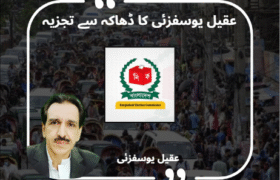Da Afghan pa nang me otharhala thoora
Nangyaale da zamane Khushal Khattak yam
دَ افغان په ننګ مِ اُتړﻻ تورا
ننګيالې دَ زمانې خوشحال خټک يم
(I have taken out my sword in the name of Afghan honour
I am the proudest of the world the Khushal Khatak)
Khushal Khan Khattak was born in 1613 at Akora in one of the major Pashtun tribe known as Khattak. Khushal Khan Khattak grandfather Malik Akoray Khan and father Malik Shahbaz Khattak was chief of Khattak tribe. His father was a prominent fighter in Mughal army and was known for his bravery. He fought many wars against Yousafzai tribe, Afridis and later on against Mughal Army. Khushal was the elder son of Shahbaz Khan Khattak, he used to accompany his father in battles from a very young age.
Khushal Khan Khattak received early education at his home, as no formal education system existed at that time. He belonged to a prosperous family, as his father was on a prominent position in Mughal army. Moreover, the Mughal emperor Shah Jahan had gifted a large piece of land to his father.
Khushal Khan Khattak was bold and intelligent since childhood, he actively participated in numerous war from an early age. Apart from the fact that he was a scholar, thinker, philosopher and a great poet, he was also a prince and the leaders of his tribe. After the death of his father Shahbaz Khan Khattak, Emperor Shah Jehan appointed him as the tribal chief and Mansabdar in 1641 at the age of 28. After the death of Shah Jahan, his relations with Aurangzeb deteriorated. In 1658, Aurangzeb, Shah Jehan’s successor arrested and kept him in prison at Gwalior fortress. After his release, he gradually distanced himself from the Mughal Empire and started his resistance campaign.
Khushal Khan Khattak was very fond of hunting and swordplay, as he himself says in a couplet:
“Knowledge of the world would have been mine, had I not indulged in the hobby of hunting”.
Khushal Khan Khattak visited far-flung areas, met with different Pashtun tribal chiefs, particularly Yousafzais, to bring unity within Pashtun against Mughals. He failed in his efforts and returned broken hearted. After failing to unite Pashtun tribes, Khushal retired as a warrior and focused on writing. Khushal Khan Khattak had written many poems, mostly patriotic about his roots, tribe, nation and triumphs over invaders. Upon his retirement, his 57 sons began fighting for leadership. Meanwhile, the Mughals had bribed his son Behram Khan to arrest or kill Khushal Khan Khattak. Bahram joined forces with Mughals and set to capture his father. On receiving the information, Khushal Khan fled to Tirah, an Afridi territory assisted by his two sons Nusrat Khan and Gohar Khan. Khushal died at the age of 76, on 20 February 1689 at Dambara.
He expressed in his will that he should be buried in a place where dust of Mughal horses’ hoofs may not fall on his grave. As per his wishes, he was laid to rest at ‘Chashmai’ village, Akora Khattak in Khattaks hills, where many Pashtuns continue to pay tribute and visit his tomb. His grave carries an inscription: “Da Afghan Pa nang mai watarala toora, nangyalai da zamanai Khushal Khattak Yam” (trans.: “I have taken up the sword to defend the pride of the Afghan, I am Khushal Khattak, the honorable man of the age.”).
Khushal Khan Khattak hoped that his struggle will ultimately bring peace in the region and Pashtuns will get freedom from the Mughal emperors. For this purpose, he tried to unite Pashtuns and to some extent he was successful by pioneering an uprising against Mughals.
Khushal’s poetry consists of more than 45,000 poems. According to some historians, the number of books written by Khushal Khan Khattak are more than 200. Some of his famous books are Bāz-nāma, a manual of falconry, Swāt-nāma, a description of a journey to the beautiful Swat Valley, Fazl-nāma, a handbook on religious and social duties, Tibb-nāma, a book on homely medicinal recipes, Farrukh-nāma, a dialogue between the pen and the sword, and Firāq-nāma, a lament of his separation from his homeland during captivity. Khushal also wrote many ghazals in Persian under the pen-name Rūhī, and a Persian qasida on the futility of the world.
Dost Mohammad Khan Kamil was the first Pashtun scholar to initiate research on Khattak along scientific lines. He wrote two important and comprehensive books, i.e “On a Foreign Approach to Khushhal” written in English and in Urdu, the book is titled “Khushhal Khan Khattak”. “Diwan-i-Khushhal Khan Khattak” was published under the directive of H .W. Bellew in 1869 (Jail Press, Peshawar), the manuscript of which was provided by Sultan Bakhash Darogha, an employee of the British government.
na ba zama ghundey bal jangyaaley rashee
na ba zama ghundey bal nangyaaley rashee
khattak la pregda pa drosth afghan khe
ajab ka dasey nar nangyaaley rashee
(Neither would there ever come someone with strong conviction, nor would someone as respectable and motivated like me. Not only among Khattaks but the whole afghan race may not produce a wise and visionary like me)



